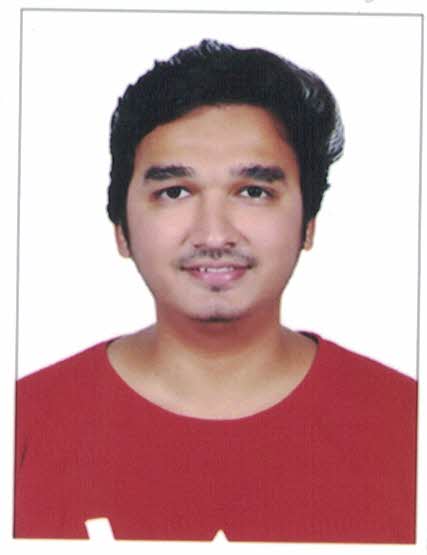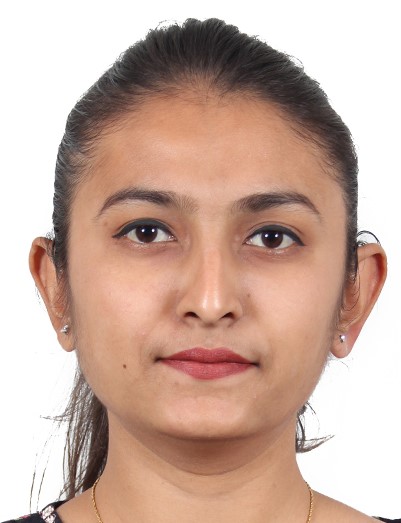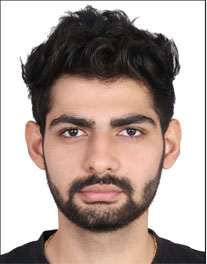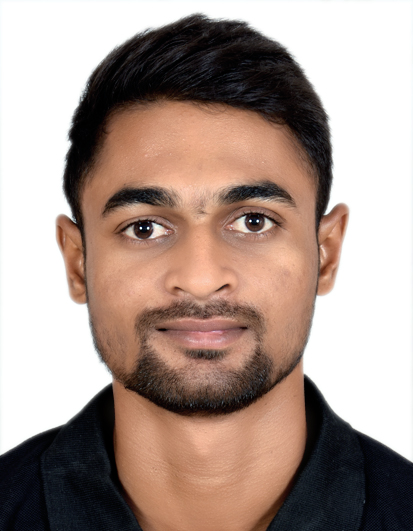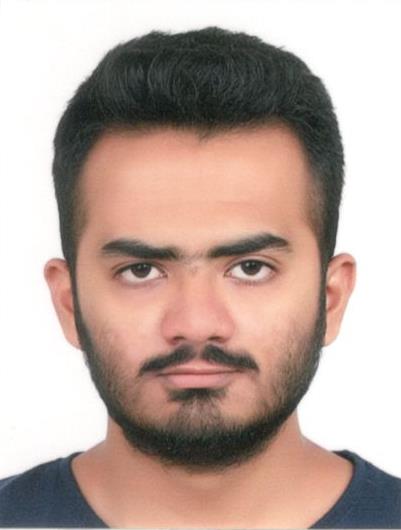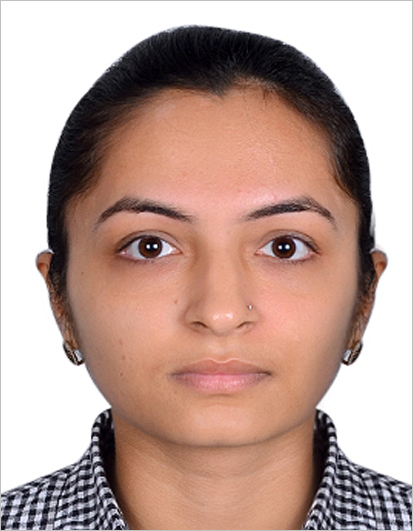- IELTS Overview
- Why Prolific?
- Exam Structure
- Batch Timings
- Test Format
- Brief on Each Section
- FAQ’s
- Miscellaneous Details
IELTS Overview
IELTS i.e. International English Language Testing System is standardized English proficiency test. It assesses English language skills in the areas of listening, reading, writing and speaking. It is jointly owned by British council, IDP- Australia and University of Cambridge ESOL examinations.
IELTS has two types of modules- Academic and General Training module. Academic module is to be given by students who plan to study at undergraduate and postgraduate levels .While, General Training module is a prerequisite for the people who either want to pursue vocational studies or plan to immigrate.
Why Prolific?
- Free repeat policy: - Student can attend the classes up to 1 year from the date of Joining, in case student has to reappear for IELTS examination during this period.
- Special faculty for one to one speaking sessions on daily basis to give you the exact feel of actual examination.
- Library facility for each module of IELTS, for students who want to practice apart from regular batches along with faculty guidance.
- Flexible batch timings for school students, college students and office employees.
- Mock tests conducted bi-weekly to avoid exam fear.
- Special workshops with British Council to stay updated with the latest changes in system.
- Score enhancement sessions conducted bi-weekly of each of the modules to brush up your skills.
- Special Basic Grammar sessions conducted bi-weekly for students whose English fundamentals are unclear and requires deep understand for concepts.
- Orientation of each module in greater detail for new students.
- Complete infrastructure and ambience which is required to boost your morale to achieve your desired results.
- Flexibility to switch batch timings in between course in case of emergencies.
- 90 minutes session to get practice of each section on daily basis.
- Smaller batches ensure personal guidance, where our trainers provide intensive and focused classroom teaching.
- Our faculty believes not only in tutoring, but also mentoring and guiding students to excel in the IELTS.
Free IELTS scheme
Students may enrol under the FREE IELTS SCHEME. Under this scheme, if a student has enrolled in a university represented by Prolific and applies for visa with that university offer, then he/she is entitled for a refund after net deduction of taxes and cost of official course ware.
The refund is applicable whether visa has been granted or not.
The Full Course at Prolific provides you with
- Question types and assessment criteria in all the four (4) modules: Reading, Listening, Writing and Speaking.
- Lots of practice tests and activities
- Study materials.
- Test tips and study strategies.
- Language focused sessions to develop your grammarand vocabulary.
- Coaching to give you detailed feedback.
- Practical advice on how to prepare yourself for the IELTS test.
Exam Structure
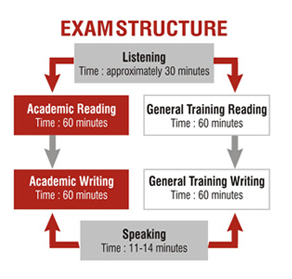
Regular Batch Timings (Monday to Friday)
Morning: - 8:30 to 10:00, 10 to 11:30, 11:30 to 1:00
Afternoon: - 2:00 to 3:30
Evening: - 4:00 to 5:30, 5:30 to 7:00
Saturday Batch Timings (Mock Tests)
9:30 to 2:00
Saturday Batch Timings (Workshops)
9:30 to 12:00
IELTS Extra Speaking (Monday to Friday)
8:30 AM to 7 PM
Test Format
In actual examination, Listening, Reading and Writing are conducted back to back. This examination lasts for approximately 2 hour and 45 minutes.
| Listening | ||
| Academic/General | 40 questions | 40 minutes |
| Reading | ||
| Academic Module | 3 passages ( 40 questions) | 60 minutes |
| General Module | 3 sections (40 questions) | 60 minutes |
| Writing | ||
| Academic Module | 2 tasks (Diagram Prompt/Argument Prompt) | 60 minutes |
| General Module | 2 tasks (Letter Prompt/Essay Prompt) | 60 minutes |
| Speaking | ||
| Academic/General | 3 parts | 11 – 15 minutes |
Listening
The module comprises four sections of increasing difficulty. It takes 40 minutes: 30 – for testing, plus 10 for transferring the answers to an answer sheet. Each section, which can be either a monologue or dialogue, begins with a short introduction telling the candidates about the situation and the speakers. Then they have some time to look through the questions. The first three sections have a break in the middle allowing candidates to look at the remaining questions. Each section is heard only once. At the end of this section students are given 10 minutes to transfer their answers to an answer sheet.
Reading
This module judges your comprehending skills. Multiple passages are given from literatures and you are required to answer variety of questions based on the given passage.In the academic module the reading test comprises three sections, with 3 texts normally followed by 13 or 14 questions for a total of 40 questions overall. The General test also has 3 sections. However the texts are shorter, so there can be up to 5 texts to read.
Speaking
This module judges your compatibility with English language. Generally it is not on the same say of your LRW (Listening, Reading and Writing) test. It is your one to one conversation with the examiner.The speaking test contains three sections. The first section takes the form of an interview during which candidates may be asked about their hobbies, interests, reasons for taking IELTS exam as well as other general topics such as clothing, free time, computers and the internet or family. In the second section candidates are given a topic card and then have one minute to prepare after which they must speak about the given topic. The third section involves a discussion between the examiner and the candidate, generally on questions relating to the theme which they have already spoken about in part 2. This last section is more abstract, and is usually considered the most difficult.
Writing
In the Academic module, there are two tasks: in Task 1 candidates describe a diagram, graph, process or chart, and in Task 2 they respond to an argument. In the General Training module, there are also two tasks: in Task 1 candidates write a letter or explain a situation, and in Task 2 they write an essay.
Scoring
IELTS is graded on a scale of 0-9, which is known as band scale. Usually 6.5 bands overall and not less than 6 bands in each module is required, which opens your doors of abroad education in your desired country.
Which materials will I use?
You will benefit from materials specially created by the British Council and the British Council Trained trainer to support you through the learning process.
What support do I get outside class?
You will get free practice tests, free study materials approved and created by The British Council and other IELTS self-study materials and the British Council Trained trainer.
Why are there two versions of the IELTS test?
IELTS has two versions – Academic and General Training. The Academic test is for those who want to study at a tertiary level in an English-speaking country. The General Training test is for those who want to work or training programmes, secondary school or migrate to an English-speaking country. All candidates take the same Listening and Speaking tests, but different Reading and Writing tests.
What documents can I use as ID (proof of identity) at the test centres?
You need to produce a valid passport when you appear for the test.
Who sets the 'pass' mark for the IELTS test?
There is no pass or fail in IELTS. Scores are graded on the 9-band system. Each educational institution or organisation sets its own level of IELTS scores to meet its individual requirements. To find out more, search the list of organisations which accept IELTS scores.
How soon can I re-appear for the IELTS test?
There is no restriction on when you can re-appear for the test. However, IELTS recommends that you reflect on your result and make additional preparations before attempting the test again.
Is the IELTS test completed in one day?
The Listening, Reading and Writing components of the test are always completed in continuous sequence, with no break. Depending on the test centre, the Speaking test may be taken prior or after the main test date.
What is the IELTS Speaking test?
The Speaking test is a conversation with a certified IELTS Examiner. The Speaking test is made up of three sections. It is recorded on an audiocassette or a digital recorder.
Miscellaneous Details.
Score Validity: 2 years
Test Fee: 12,650 INR
Score reporting time: 13 days.
Nature of Test: Paper based test
Test Repetition Policy: Next date available.
Rescheduling fee: 3150 INR
Registration Mode: Prolific Centre/ Mail/ Online/ Telephone


